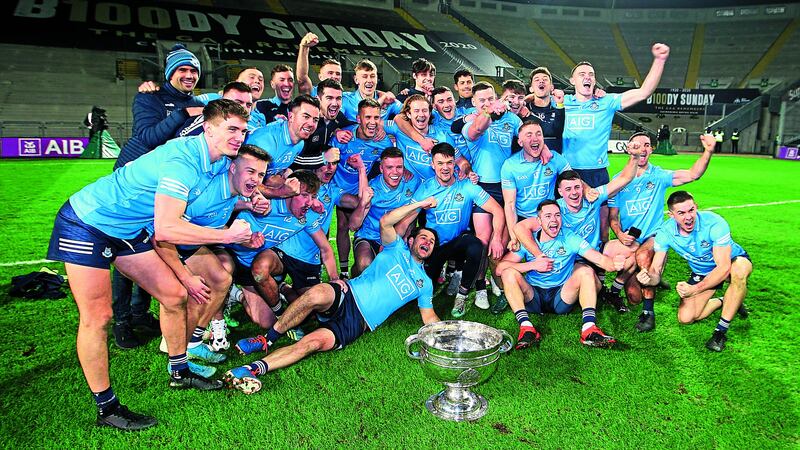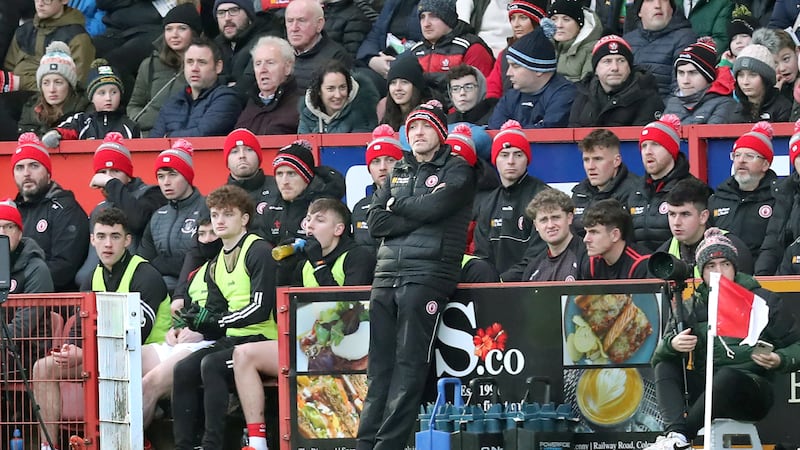MAYBE it is simply being a child of the ‘90s and, even as a very young boy whose memory is short on detail, knowing Derry, Down and Donegal were taking it in turns that created this wondrous feeling of unpredictability.
Croke Park appealed but All-Ireland finals of the late ‘90s always seemed to be played in grey weather in front of 80,000 light-grey mac coats.
The late ‘90s tended to produce one-sided, disappointing affairs that never really did justice to the occasion.
It was actually Leinster finals that really drew me in. Watching Dublin teams you thought should be winning but in their flaws gave extra weight to the victories of Meath or Kildare or Offaly, carrying on into the Westmeath and Laois teams that broke the mould in the early noughties.
Those were not in the days before money, because there was plenty of it swirling around.
These were just the days before people figured out the best way to spend it.
Increasingly, money within the GAA is spent on accumulating professional expertise.
You only need to look at the day job of most inter-county managers to understand that they are simply surrounding themselves with like-minded people.
Jim Gavin’s background in aviation is well-established, but his replacement is hardly a slow poke. Dessie Farrell is chairman of an IT company that boasts partnerships with Microsoft, Hewlett and Dell.
Liam Sheedy, provincial director with Bank of Ireland.
John Kiely, school principal.
Feargal Logan, solicitor. Brian Dooher, veterinarian.
Padraic Joyce, CEO of a recruitment agency.
Peter Keane, owns a SuperValu in Killorglin, as he delights in turning conversation to when journalists try to distract him with football.
On and on and on that list goes. Men spending their days on the tools aren’t spending their evenings on the pitch orchestrating affairs.
That is partly because the skillset required by a modern inter-county manager is that of a successful businessman.
A huge part of that is the ability to delegate jobs.
And then there’s the players themselves, who largely are in professional occupations or are third-level students preparing to work in the real world, or teach.
There is a massive degree of scoffing and tutting when it gets to the All-Ireland stages and counties start to have their backroom teams published in the programme for games.
Each year they’re bigger, with more new roles imagined. Assistant goalkeeping coach, performance consultant, all the works.
Dublin’s backroom team last year totalled 28. Limerick hurlers had 20. Mayo footballers had 17.
Those two lower-end figures would be nothing unusual.
Professional people surround themselves with like-minded people and the best functioning inter-county teams now operate at a level, and converse in a language, that it’s hard to understand from the outside.
We can all snigger and question and use it as a stick to poke with when it all breaks down in defeat, but those within the setups understand the role and value of these people.
A generation ago, the work of Caroline Currid would have been as far removed from success with a GAA team as you could imagine.
The idea of sports psychology was known as man management, and it involved speaking the language of the players.
Eamonn Coleman had a growing clutch of professionals at hand, but he also had a large number of tradesmen. He spoke the language of the common man and that’s what the Derry players of that era responded to.
It is different now. The youth of the current generation are not only generally educated to third-level and beyond, but the sporting youth educates itself in the body and mind.
They know about the body, about the science behind calorie intakes and deficits, about which exercises target which muscles. A few laps for a warm-up wouldn’t get a management team too far now.
Not everyone is the same and some still roll their eyes at the idea of video analysis or mindfulness.
But this is the language that All-Ireland winning teams have spoken for a while.
The kind of continuous improvement and sustained excellence that Dublin have created within their closed bubble is unsustaining in any other environment.
We can cry bullshit at it all we like, complain that when the players speak in public that they speak gibberish about the performance piece.
I’m not pretending to understand it all. But I do understand that the players understand it, and that this is how they talk inside the group.
What we hear on the outside is not a formula of words designed to distract, but an accurate representation of how inter-county teams actually operate.
And we can cry about how the move towards professionalism insulates the players further away from the general public, that they can be seen as aloof and removed and uncaring about the damage it’s all having on the club environment.
But really, we just care about the game.
If the games look good, the public has no problem swallowing the rest of it.
Problem is that few counties can afford the level of expertise that now wins All-Irelands.
There are very few amateurs left at the head of inter-county football, but some counties have such deep resources that they can tick more and more boxes, cover off more and more of the tiny percentage improvements they’re looking for.
It might not be popular and it might not be cheap, but it’s the way it is because it’s the way players expect it to be.
We can howl at them for speaking a new language, or we can accept the old one is dead and look about learning something instead.







